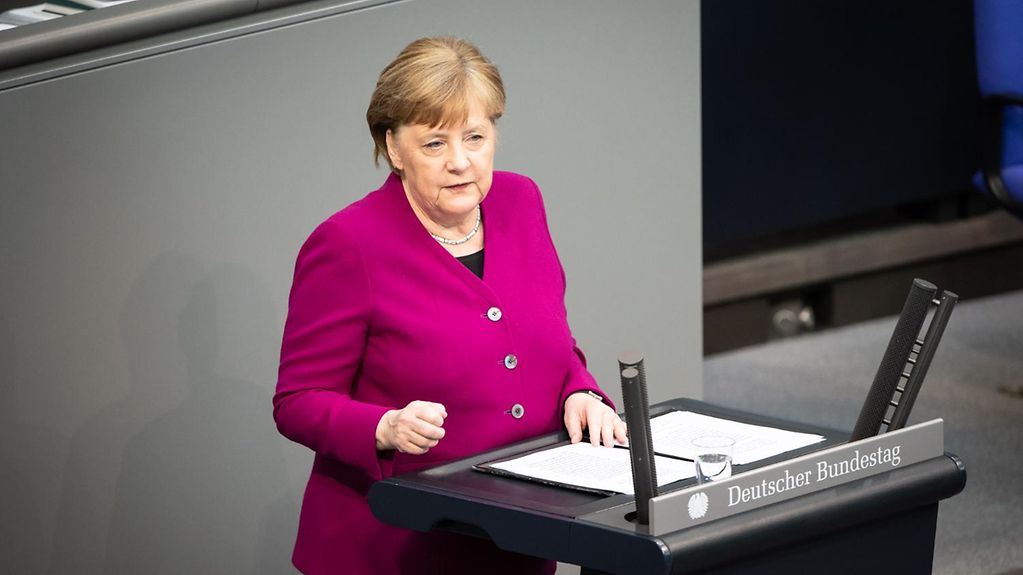Chancellor's government statement
Together, we have managed to slow the spread of the coronavirus, stressed Chancellor Angela Merkel, speaking in the German Bundestag. Nevertheless she warned of the dangers of easing restrictions too early. "We are on thin ice," said Angela Merkel. European solidarity is called for more than ever before to fight the pandemic and its consequences, she declared.
4 Min. Lesedauer

Chancellor Angela Merkel during her government statement in the German Bundestag on Thursday
Foto: Bundesregierung/Steins
In her government statement, Chancellor Angela Merkel called for understanding for the continued restrictions imposed as part of efforts to address the COVID-19 pandemic. "We are not in the final phase of the pandemic – we are still at the beginning," said Angela Merkel on Thursday in the German Bundestag.
How to prevent the virus bringing the health system to its knees and costing innumerable lives will continue to be the central focus of politics in Germany and Europe for a long time to come, she said. All the steps taken in recent weeks have managed to achieve one important goal. "So far our health system has withstood the strain."
Difficult decisions
The Chancellor said she was very acutely aware what a strain the restrictions imposed on every individual and on society as a whole. The pandemic, she said, is putting an "enormous strain on democracy" and limiting our "existential rights and needs".
A situation like this is only tolerable if the reasons for the restrictions are transparent and easy to understand, and if criticism and objections are not only permitted but actively requested and heard. The decision to restrict personal liberties was one of the most difficult decisions she had had to take as Chancellor, said Angela Merkel.
Stressful situation in care homes
The isolation and loneliness of people in care homes and homes for the elderly is particularly stressful. It is "cruel" when nobody can be there apart from the carers. "These 80- and 90-year-olds built up our country. They laid the foundations for the prosperity we enjoy today, said Angela Merkel, and added, "We are fighting the virus for them too."
By working together we have at least managed "to slow the path of the virus through Germany and Europe," said Angela Merkel in the German Bundestag. This has only been possible with the help of everybody who has "done their best for others with their heart and with their head," stressed the Chancellor. "I am incredibly grateful for this," she said.
The Chancellor stressed that the decisions taken by the federal and state governments about restrictions and first steps to ease these have her unqualified support. "But the way these agreements have since been translated into practice gives me grounds for concern." Some procedures appear to be too fast, even foolhardy". This statement, however, "in no way" changes her total respect for the federal system laid out in the German Basic Law or constitution, which gives the individual federal states the authority "under the Infection Protection Act too," added Angela Merkel. "Let us not squander what we have achieved and run the risk of a relapse," called the Chancellor. Our actions must be "clever and circumspect".
The most recent figures published by the Robert Koch Institute indicate that things are moving in the desired direction, said Angela Merkel. Nevertheless, we are "on thin ice – it is true to say, we are on the thinnest of ice". The situation is deceptive. Germany is not out of the woods yet, she declared. "This is a long haul and we must be careful to ensure we do not run out of strength and steam too early."
In the final analysis, only a vaccine can end the pandemic, said Angela Merkel. Until a vaccine is developed, it is her duty to warn and not to express vague hopes, she said. The German government is providing financial support for work to develop a vaccine, with a large contribution towards a new national research network.
Virus can only be fought at international level
The German government supports the World Health Organization and its mandate, underscored the Chancellor. A virus that spreads across all states can only be tackled at international level – in the EU, the G20 and in cooperation with African states.
Angela Merkel unlined how important European solidarity is to overcome the pandemic. Our destinies are bound together, we are a community and are there for one another – especially in the face of hardship we are suffering through no fault of our own. "In the long term, Germany can only do well if Europe does well," stressed the Chancellor.
EU rescue package to be implemented swiftly
The Chancellor urged the swift operationalisation of EU assistance for the states worst hit by COVID-19. "This pandemic affects everybody, but it does not affect everybody on the same scale," she said. It is up to us to demonstrate "who we, Europe, want to be". She expressed her hope that the funds under the economic recovery programme worth more than 500 billion euros will be available as of 1 June.
Angela Merkel also advocated a European economic recovery programme for the next two years. "We should be willing," said the Chancellor, "to pay quite different, significantly higher contributions to the European budget for a limited period in a spirit of solidarity" to enable all member states to recover.
Calls for so-called corona bonds, which would communitarise debt, are not helpful however, if only for the reason that every national parliament would have to agree to transfer some authority over the national budget to European level. This would be a very time-consuming process at a time when what is needed is "swift assistance and the rapid availability of instruments to alleviate the consequences of the crisis".